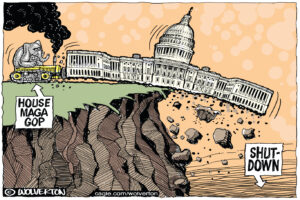Wanna Play the Budget Expectations Game?
It goes like this: Make artificially gloomy budget forecasts at the start of the year; then, at the end of the year, when the numbers outperform your disingenuousness, announce that the economy is on the upswing The L (more).It goes like this: Make artificially gloomy budget forecasts at the start of the year; then, at the end of the year, when the numbers outperform your disingenuousness, announce that the economy is on the upswing. The L.A. Times has the lowdown.
L.A. Times:
WASHINGTON ? When President Bush releases the traditional midsummer update on the budget today, he is expected to announce that federal revenue has soared above predicted levels and that the deficit is headed for a welcome decline from earlier estimates ? as much as 30%, or $125 billion, below the level projected just five months ago.
And the president will likely attribute the windfall to his tax cuts, which the administration says are stimulating economic activity and generating the torrent of tax revenue.
But the apparent good news will not strike some economists as surprising: This will be the third year in a row that the administration put forth relatively gloomy deficit forecasts early on, only to announce months later that things had turned out better than expected. To some skeptics, it’s beginning to look like an economic version of the old “expectations” game.
Even economists who hesitate to accuse the White House of playing games say the claims of good news on the budget are unfortunate because they make people unjustifiably sanguine about the government’s current fiscal health.
Independent journalism is under threat and overshadowed by heavily funded mainstream media.
You can help level the playing field. Become a member.
Your tax-deductible contribution keeps us digging beneath the headlines to give you thought-provoking, investigative reporting and analysis that unearths what's really happening- without compromise.
Give today to support our courageous, independent journalists.






You need to be a supporter to comment.
There are currently no responses to this article.
Be the first to respond.